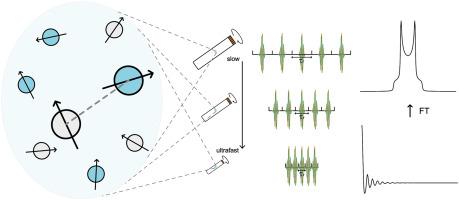Solid State Nuclear Magnetic Resonance ( IF 1.8 ) Pub Date : 2021-01-11 , DOI: 10.1016/j.ssnmr.2020.101711 Yi Ji 1 , Lixin Liang 1 , Xinhe Bao 2 , Guangjin Hou 2

|
With the recent advances in NMR hardware and probe design technology, magic-angle spinning (MAS) rates over 100 kHz are accessible now, even on commercial solid NMR probes. Under such fast MAS conditions, excellent spectral resolution has been achieved by efficient suppression of anisotropic interactions, which also opens an avenue to the proton-detected NMR experiments in solids. Numerous methods have been developed to take full advantage of fast MAS during the last decades. Among them, dipolar recoupling techniques under fast MAS play vital roles in the determination of the molecular structure and dynamics, and are also key elements in multi-dimensional correlation NMR experiments. Herein, we review the dipolar recoupling techniques, especially those developed in the past two decades for fast-to-ultrafast MAS conditions. A major focus for our discussion is the ratio of RF field strength (in frequency) to MAS frequency, /, in different pulse sequences, which determines whether these dipolar recoupling techniques are suitable for NMR experiments under fast MAS conditions. Systematic comparisons are made among both heteronuclear and homonuclear dipolar recoupling schemes. In addition, the schemes developed specially for proton-detection NMR experiments under ultrafast MAS conditions are highlighted as well.
中文翻译:

固态核磁共振快速 MAS 下偶极重耦合技术的最新进展
随着 NMR 硬件和探针设计技术的最新进展,现在可以使用超过 100 kHz 的魔角旋转 (MAS) 速率,即使在商用固体 NMR 探针上也是如此。在如此快速的 MAS 条件下,通过有效抑制各向异性相互作用实现了出色的光谱分辨率,这也为固体中的质子检测 NMR 实验开辟了道路。在过去的几十年中,已经开发了许多方法来充分利用快速 MAS。其中,快速 MAS 下的偶极重耦合技术在分子结构和动力学的确定中起着至关重要的作用,也是多维相关核磁共振实验的关键要素。在这里,我们回顾了偶极再耦合技术,特别是在过去二十年中开发的用于快速到超快 MAS 条件的技术。/,在不同的脉冲序列中,这决定了这些偶极重耦合技术是否适用于快速 MAS 条件下的 NMR 实验。在异核和同核偶极重耦合方案之间进行了系统比较。此外,还重点介绍了专为超快 MAS 条件下的质子检测 NMR 实验开发的方案。











































 京公网安备 11010802027423号
京公网安备 11010802027423号